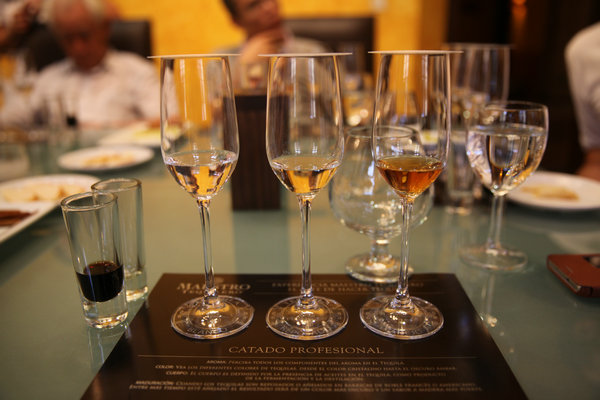It's sunrise for a hot Latin spirit
By Dong Fangyu ( China Daily ) Updated: 2015-12-26 11:14:46
 |
|
Once the leaves have been chopped off, the heart of the blue agave, called the pina, is what is used to make tequila.[Photo by Maxime Lu/China Daily] |
"I see the bar industry as where tequila will be focused," says Del Toro, adding that 10 tequila training programs involving 200 bartenders were held in China's first-tier cities this year.
"We are trying to reach the younger generation who are open to try new and different things. Their parents used to drink cognac, or baijiu or whiskey. They may not want to drink the same as them, wanting to be different."
The spirt of that opinion seems to have been distilled into the slogan of Casa Tequila, an importer in Shanghai, which says: "Don't drink what your father drinks. Drink Tequila."
Joel Gong, business development director of Casa Tequila, which specializes in fine-quality tequila, says the company's sales have increased ever since the ban on 100 percent blue agave was lifted.
Nevertheless, Sun Zhijun, a wine and spirits expert in Yantai, Shandong province, says tequila remains very much a minority drink in the country.
"People drink it only in bars and restaurants, and hardly anyone drinks it at home."
Sun, translator of the Chinese edition of the book Around the World in 80 Bars: Discover 80 of the World's Best Cocktails and the Bars That Made Them Famous, says: "The taste and physical characteristics of a spirit do count, but what's more important is how it is promoted. Chinese have not been drawn to whisky and cognac overnight, and it takes time to sow perceptions."
The key to promoting a drink is marketing a culture, he says.
"How much does Mexican culture mean to Chinese? How do you position Mexican culture in Chinese consumers' minds? These are very important questions that need to be considered."
Sun cites France as an example.
"Many Chinese have a strong affinity and liking for French gourmet culture, and as a result they have been keen to find out about French drinks. Chinese consumers need to be made aware not only of the taste of tequila, but of the blue agave plant from which it comes, the production process and the culture of tequila generally."
Chinese white-collar customers who have developed a habit of drinking baijiu may be among the most likely customers for tequila, Sun says.
Just like Cognac or Champagne, there are strict laws about where and how it is made. The two French drinks come, of course, from regions of the same name. Tequila must be made in the state of Jalisco or certain parts of the states of Guanajuato, Michoacan, Nayarit, and Tamaulipas.
|
|
|
|
|
|
|
|

























 Raymond Zhou:
Raymond Zhou: Pauline D Loh:
Pauline D Loh: Hot Pot
Hot Pot Eco China
Eco China China Dream
China Dream China Face
China Face






